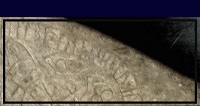When, literally, there are no words, there is no self.
Last time, I wrote about the phenomenon of hypergraphia as part of a collection of possible attributes that comprise Geschwind Syndrome, itself sometimes a feature of temporal lobe epilepsy. Having an over-abundance of words can be a wonderful “symptom” for a writer to have. But in my case TLE has on occasion led to a frightening, albeit brief, type of seizure producing aphasia: the complete loss of words. There are TLE seizures that are enjoyable when I’m given the leisure to entertain them: euphoria, dreamlike, dreaming-while-wide-awake, all-encompassing deja-vu states that hyper-stimulate both memory and creativity. But of all the unpleasant seizures that go along with TLE, none that I experience are anywhere near as horrible and frightening as the aphasia one.
I must be forgiven for complaining, because my seizures are relatively mild (and after Cymbalta was invented for my fibromyalgia I began to get quality sleep and the seizures have all but disappeared) and, being temporal lobe seizures, are usually undetectable to the outside world. But appearances most absolutely and certainly can be deceiving.
I know that the dreaded sensation I’m about to describe lasts probably only a second or even less, but believe me, it feels like an eternity while I’m “in” it.
It begins with a metaphorical “aphasia cattle prod” that hits me right between the eyes and it’s almost as if I’m being physically struck backwards; in the same moment my mind is wiped utterly blank. You can’t even imagine how blank. I suddenly have NO WORDS–none, nothing to think with. And the sensations are overwhelming: I feel as if I’m falling in total blackness, my hands clutching the air and finding nothing to hang onto, and with that/because of that I’m feeling utter terror, just about the worst terror I’ve ever known. (You can’t see me right now, but as I try to put myself back into that place, my hands are actually clawing at the air.)
During this eternity-moment I feel like I’m not even alive anymore; it feels as though I’ve been instantaneously relegated to a strange nether-world or limbo where life and death are the measure of nothing. I have no words so I can’t think! I may as well be a non-sentient slug in a petri dish. You can poke me and I might have an autonomic reaction, but I won’t be able to think about my past or my future or why I’m being poked. I can’t even think about thinking. I can’t think about myself as being apart from the petri dish or the poke or the pok-er or the pain. There is no form or structure for my consciousness; I’m not human when I have no words.
Of course my entire description of the experience is only possible in after-thought, and certainly what the experience is not occurs to me only as part of a sensation during the actual seizure. Falling and flailing in blackness and in terror is as much as I know at the time. It’s more than enough.
Afterwards I have a residual pressure (absence of pressure?) fogging me up right between and behind the eyes, a bit of fatigue after the aura, but a profound sense of relief to be standing on firm ground again. Sensory input flows through my mind again and the little talker in my head assigns what I experience words and descriptions and I exist once more.
The capacity for aphasia even for a moment scares the daylights out of me, and I can only begin to imagine the horror for people whose neurological impairments are more long-term. Oliver Sacks, the neurologist and writer, has described in multiple books some of the more strange and painful variations brain-damage can exhibit. There are more familiar conditions like Alzheimer’s, Parkinson’s, and the catatonic conditions seen in the film Awakenings, based on Dr. Sacks’ work. These are conditions which, like Geschwind Syndrome, can challenge one’s very definition of personhood and sense of self. I appreciate every day not being on that end of the spectrum.
So hard-wired wordiness aside, I honestly don’t take for granted that my reliance on words, my love of words, my very self-perception and definition through words is a given. Rather I know that it is a gift, this indicator of sentience and human-ness. I see words for the magic they are and I’ve understood for as long as I’ve used them the drive to tell stories with them, to make something that wasn’t there before I took pen to paper.



